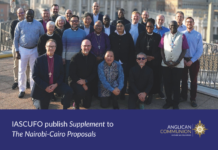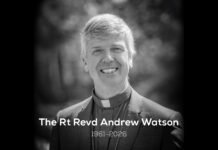It is a matter of regret that articles have been published on social media sites without the Free Church of England’s perspective having first been sought. In relation to the closure of St Stephen’s Church in Middlesbrough, the following clarifications are offered.
- In 2016 the premises of St Stephen’s Church, Middlesbrough (which were owned by the Free Church of England Central Trust (a charitable company incorporated in 1941)) were found to be in a dangerous state of repair.
- Following consultation with the congregation, in 2017 the Free Church of England Central Trust sold the property.
- The remaining congregation (fewer than 10 people) began worshipping in community centres, including the John Paul II Centre which was generously made available by the Roman Catholic Diocese of Middlesbrough.
- Following consultation with the congregation the Central Trust agreed to spend a portion of the proceeds of sale to provide a Minister in the hope that he could revive the congregation. This decision was widely reported in the denomination and published in the Year Books.
- In April 2018 a Minister was engaged at a stipend of £24,000 per annum plus accommodation costs and expenses.
- Two years later there had been no significant growth in the size of the congregation. It was certainly not able to take on the costs of a Minister.
- It was a requirement of the Minister’s contract that it be reviewed after two years and that there be an annual review of the ministry thereafter, conducted by the Churchwardens in consultation with the Diocesan Bishop.
- At the Annual Congregational meeting in February 2020 the Churchwardens’ review drew attention to the fact that the allocated sum was being depleted and that supplementary sources of funding needed to be sought, beginning immediately. The Minister claimed he was too busy to action this, despite a commitment in the review to meet quarterly with the congregation to do so.
- In November 2020 the General Secretary of Central Trust wrote to the Minister reminding him of the fact that the allocated funding was being depleted, but, rather than simply ceasing payments in March 2021 (when the allocated funding would be exhausted), offering him a further six months’ half stipend beyond that date to enable the ministry to continue and give time for new sources of funding to be identified. The Minister refused the offer.
- The next annual review of the ministry was due in February 2021 in time for the Annual Congregational Meeting. By this time there was only one Warden in post, the other having resigned earlier in the year in protest at the Minister’s behaviour. The remaining Warden agreed with the Bishop that, since meetings were not permitted under pandemic regulations, all members of the Church Council (as representatives of the congregation) would be contacted by telephone or social media and their views sought.
- All members of the Church Council were contacted. Two refused to take part in the review, apparently on the Minister’s advice.
- The remaining members (who constituted two thirds of the Church Council) all expressed dissatisfaction with the Minister’s ministry. They also unanimously agreed that things had not worked out as hoped and that, since the funds had now run out, the Church should be closed. They have all confirmed this in writing.
- The combination of these two factors (the exhaustion of the allocated funds and the request from the Church Council that the Church be closed) meant that the Minister’s role as Stipendiary Presbyter was at risk.
- Legal advice was therefore sought. The advice was that it was necessary for a redundancy consultation process to commence. The remaining Warden, as ‘employer’ under the contract, gave Central Trust her authority to conduct this on her behalf, and confirmed this in writing.
- A redundancy process, supervised by legal advice, was therefore initiated. The Minister was allowed Trade Union representation and the right of appeal – both of these more than he was entitled to by law.
- Following two redundancy meetings there had been no material change in the situation and the Minister was made redundant on 22 February 2021. All due payments were made.
- There were no alternative paid posts in the Free Church of England that he could be offered.
- The Minister appealed and his appeal was heard on 9 March 2021. The appeal was considered by Central Trust at meetings on 18 and 19 March. The appeal was unsuccessful. (Bishop John Fenwick took no part in the appeal process and was not a party to the final decision.)
- Following the Minister’s redundancy on 22 February, the Diocesan Bishop, on legal advice, with great sadness, acceded to the Church Council’s request and withdrew recognition from St Stephen’s Middlesbrough as an organised congregation of the Free Church of England otherwise called the Reformed Episcopal Church on 23 February.
- Although not a factor in the redundancy process, there had been concerns about the Minister’s pastoral ministry. Four separate complaints had been made from women about his behaviour towards them. These had been discussed by the Bishop with the Safeguarding Officer. While not requiring the triggering of Safeguarding procedures, they were nevertheless raised by the Bishop with the Minister who refused to take them seriously or discuss them. There was also a complaint about cruelty to an animal. There had been other expressions of dissatisfaction.
- ‘Scattered Membership’ is a form of membership regulated by Canon. It is open to any former member of St Stephen’s to apply. Several have done so and so continue their membership of the Free Church of England.




Interesting – is this the same congregation that now worships as “Word and Spirit Church Teesside”? Their facebook page is easy enough to find, and some the posts appear to refer to a previous existence in the FCE.
They appear to be continuing well enough.
This is a baffling statement. Who authored it? No contact names are given. Was it authorised by the FCE General Council, whose members are elected by the FCE’s governing body, its Convocation?
And was it checked by a lawyer for any potential breaches of the Defamation Act 2013?
I have just had this e-mail from one of the women who, the statement alleges, complained about the former FCE minister of St Stephen’s Middlesborough:
‘Dear Julian,
I am writing since I have reason to believe I may be one of four unnamed women mentioned in the penultimate bullet point of this article https://anglican.ink/2021/04/12/a-statement-concerning-st-stephens-church-middlesbrough-from-the-free-church-of-england/
While I am content for you to publish the below in response, I ask that you withhold my name from publication.
I wish to repudiate entirely any idea that I ever made any formal complaint to Bishop John Fenwick regarding the conduct of the Revd Jonatas Bragatto towards me. The Revd Jonatas has always behaved towards me with the utmost Christian decorum and I regard him as a godly young man.
Without witnesses and proper written accusations, I regard this FCE statement as the kind of fallacious slander condemned by Leviticus 19:16.’
Where did my earlier comment and Julian Mann’s comment go? Is someone seeking to protect John Fenwick from scrutiny with regard the wild allegations made in the statement above?
I thought that Julian Mann’s comment was excellent.
I posted a similar comment (more detailed) calling out the slanderous accusations, but it seems that someone may have persuaded the administrator to take it down.
Like Julian Mann, I happen to know that another woman who is claimed to have made an allegation, but she also refutes that she ever made such a complaint.
In my original comment, I also identified the other two complainants – as women who have nothing to do with the Middlesbrough Church and are closely known to the Bishop himself. In my earlier comment today, i made clear who those women were. Perhaps this is why my comment was removed. This time my comment is deliberately more vague and is therefore undoubtedly compliant with the comments policy.
I did also comment about the ludicrousness of the animal cruelty allegation too, as I am informed by people in the FCE that this related to Rev Jonatas having a puppy pad on the floor, during the house training of a much loved and well cared for puppy, and was a mere comment raised by his landlady. The suggestion of anything else is indeed terribly slanderous.
The escalation/manipulation of these non-complaints, i pointed out, raises more concerns about the Bishop’s actions than they do about Rev Jonatas and in the context of other serious concerns about the FCE’s financial governance, I pointed out that it looks more like someone is on a campaign to oust whistleblowers.
I also made the obvious comment that only allowing two years to grow a small church was entirely unrealistic and contrary to all church planting / church regeneration advice. My view is that all of this raises serious questions about the spiritual insight and the grasp of reality regarding what it takes to grow a church of the leadership of the northern diocese. But given that the northern diocese has been a story of decline and church closure in recent years, perhaps we should not be so surprised.
Thanks for the extra information. I couldn’t help but notice that the statement gives an initial impression of being specific, but once one reads it in detail, there is actually very little specific in it.
It is always important in these things not to rush to judgment, but try to find out what may really be happening. Often that takes time.
I do wish all the best to anyone trying to establish a new congregation. And you are right that it takes a lot of time, prayer and effort.
This statement is baffling. Who authored it? There are no contact names given. Was it authorised by the FCE General Council, whose members are elected by the FCE’s governing body, its Convocation?
Also, was it checked by a lawyer for potential breaches of the Defamation Act 2013?
Today I received this e-mail from one of the women who, the statement alleges, made a complaint about the former FCE minister of St Stephen’s Middlesborough:
‘Dear Julian,
I am writing since I have reason to believe I may be one of four unnamed women mentioned in the penultimate bullet point of this article https://anglican.ink/2021/04/12/a-statement-concerning-st-stephens-church-middlesbrough-from-the-free-church-of-england/
‘While I am content for you to publish the below in response, I ask that you withhold my name from publication.
‘I wish to repudiate entirely any idea that I ever made any formal complaint to Bishop John Fenwick regarding the conduct of the Revd Jonatas Bragatto towards me. The Revd Jonatas has always behaved towards me with the utmost Christian decorum and I regard him as a godly young man.
‘Without witnesses and proper written accusations, I regard this FCE statement as the kind of fallacious slander condemned by Leviticus 19:16.’
This statement is baffling. Who authored it? There are no contact names given. Was it authorised by the FCE General Council, whose members are elected by the FCE’s governing body, its Convocation?
Also, was it checked by a lawyer for potential breaches of the Defamation Act 2013?
Today I received this e-mail from one of the women who, the statement alleges, made a complaint against the former FCE minister of St Stephen’s Middlesborough:
‘Dear Julian,
I am writing since I have reason to believe I may be one of four unnamed women mentioned in the penultimate bullet point of this article (the statement above).
‘While I am content for you to publish the below in response, I ask that you withhold my name from publication.
‘I wish to repudiate entirely any idea that I ever made any formal complaint to Bishop John Fenwick regarding the conduct of the Revd Jonatas Bragatto towards me. The Revd Jonatas has always behaved towards me with the utmost Christian decorum and I regard him as a godly young man.
‘Without witnesses and proper written accusations, I regard this FCE statement as the kind of fallacious slander condemned by Leviticus 19:16.’
An interesting article has appeared in the daily telegraph … now we learn that it is not only the Charity Commission looking into this, but also West Midlands Police are interest as a possible serious case of fraud. https://www.telegraph.co.uk/news/2021/04/18/former-archbishops-aide-faces-questions-missing-300000/
What i don’t understand is why the Bishop’s haven’t explained exactly where the money has gone? Apparently they have been asked numbers of times – but no clear answer has been given. It should be a very simply thing to demonstrate, if it is correctly accounted for in their accounts.
An interesting article has appeared in the Daily Telegraph this morning asking questions about this £300,000 and other financial irregularities in Trusts over seen by Bishop John Fenwick … Apparently it is not only the Charity Commission looking into this, but also West Midlands Police are interest as a possible serious case of fraud!
Anglican Ink’s comments policy does not automatically allow all links, so you will have to search for the article entitled “Former archbishop’s aide faces questions over ‘missing’ £300,000” (or searching John Fenwick Daily Telegraph should do it).